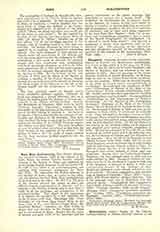

Bona Mors Confraternity, the (HAPPY DEATH), was founded October 2, 1648, in the Church of the Gesu, Rome, by Father Vincent Caraffa, seventh General of the Society of Jesus, and approved by the Sovereign Pontiffs Innocent X and Alexander VII. In 1729 it was raised to an archconfraternity and enriched with numerous indulgences by Benedict XIII. He authorized the Father General of the Society of Jesus, who, in virtue of his office, was the director, to erect Bona Mors confraternities in all churches of his order. In 1827 Leo XII gave to the director general the power to erect and affiliate branch confraternities in churches not belonging to the Society of Jesus, and to give them a share in all the privileges and indulgences of the archconfraternity. The object of the association is to prepare its members by a well regulated life to die in peace with God. The longer title: “Confraternity of Our Lord Jesus Christ dying on the Cross, and of the most Blessed Virgin Mary, His sorrowful Mother”, expresses the chief means to attain that end, devotion to the Passion of Christ and to the sorrows of Mary. Besides this the union of prayers and good works of the associates and the special instructions at the public meetings help powerfully to prepare for a happy death. The conditions for membership are to present oneself to the director; to express to him one’s desire to become a member; to receive from him an outward sign of acceptance, usually in the form of a certificate of admission; and to have one’s name registered in the local Bona Mors Register. Only “by an unusual and extraordinary exception”, says a decree of the Sacred Congregation of Indulgences, “is it allowed to enroll those absent”. The director is authorized to decide what constitutes such an exceptional case. The practices of the association and the indulgences granted to the members are specified in the manual of the confraternity (New York, 1896).
JOHN J. WYNNE

